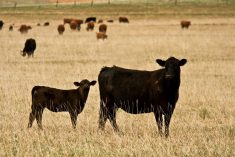Cargill’s southern Alberta beef packing plant, estimated to be responsible for over a third of Canada’s beef processing capacity, restarted Monday after a two-week COVID-19-related shutdown — but at a quicker pace than previously expected.
The company said in a statement Monday it is resuming operations at the High River plant “with two shifts” in its harvest department, to be followed by fabrication shifts starting Wednesday (May 6). The company had previously said it would resume operations Monday beginning with a single shift per day.
Read Also

U.S. not ready to lift Mexican cattle ban over screwworm, Agriculture Secretary Rollins says
The U.S. is not yet ready to reopen its border to Mexican cattle amid an outbreak of the flesh-eating New World screwworm parasite, Agriculture Secretary Brooke Rollins said, but she is pleased with Mexico’s efforts to contain the pest.
Plant employees “who are healthy and eligible to work in our harvest department” have been asked to report to work, the company said Monday.
The company in mid-April had slowed production at the plant to a single shift, and temporarily idled the plant a few days later due to the COVID-19 outbreak among employees.
United Food and Commercial Workers (UFCW) Local 401 said in a separate statement Sunday that out of about 2,000 High River employees it represents, 921 so far have tested positive for COVID-19 — including one who died of the disease on April 18 — and that “over 1,500 positive cases” are now linked to the plant.
Province-wide, as of Monday afternoon, Alberta has confirmed 5,836 cases of COVID-19. Of those, 2,942 people have recovered and 104 have died.
The union said Friday it had filed a request with the provincial labour department’s occupational health and safety arm for a stop work order at the plant, and had also filed an unfair labour practice complaint, naming Cargill and Alberta’s provincial government as respondents.
“We have taken legal action, and we are continuing to review all legal options, including going to court,” UFCW 401 said in a statement Friday to members.
As of Sunday, however, “the situation has not been resolved,” the union said. “At this moment, we have been unable to convince any government or legal authority to have the courage to step in and ensure the plant remains closed until safety is assured.”
For Monday, the union advised members that “if you are healthy and have been called and cleared to return to work, you should report to your supervisor,” but also to “ensure that Cargill is keeping you safe” and “(i)f you don’t really think it is safe to work, then don’t.”
“We believe our members have the right to refuse to perform dangerous work if they reasonably feel they are in danger,” UFCW 401 president Thomas Hesse said in Sunday’s statement.
Cargill, in its statement Monday, emphasized employees who return “should be healthy and not had contact with anyone with the COVID-19 virus for 14 days.”
Citing health officials, the company said Monday that “the majority of our employees remain healthy or have recovered.”
Alberta Health Services officials would be on site, the company said, and “we will conduct our ongoing screening to safeguard employees and ensure no one exhibiting symptoms enters the facility.”
The High River shutdown and production slowdowns at other plants have backed up Canadian cattle onto feedlots and ranches, leaving cattle producers calling for “mitigation measures” including a national set-aside program.
Alberta Beef Producers last week asked its members to contact their MPs and MLAs calling for such measures. The organization said its members recognize “ensuring the health and safety of people is a top priority” which in turn could require beef plants to shut down or cut back their processing pace. — Glacier FarmMedia Network












